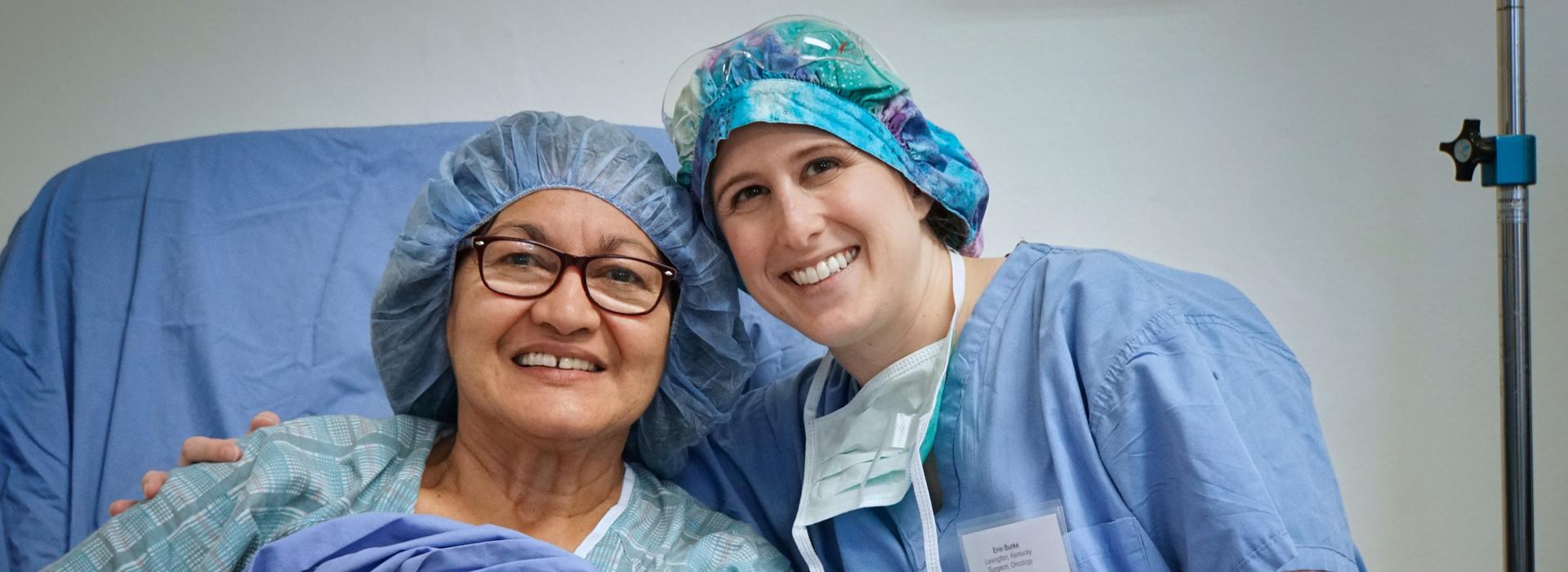
Honduras
Todd Tuttle, MD, MS - surgical oncologist and breast cancer specialist - first visited Honduras in 2009 to provide free surgical care to underserved patients. Since 2012, he and other medical professionals from the University of Minnesota have been providing clinical care at the Holy Family Surgery Center (HFSC) in Honduras since 2012. In 2019, the University of Minnesota began expanding its reach to include provider training, patient education, clinical research, and institutional partnerships with the goal of continuing to address disparities within patient care in Honduras.
Clinical Care
HFSC provides patient consults and surgeries year-round under the leadership of Medical Director Dr. Merlin Antúnez, a Honduran orthopedic surgeon who grew up in the children’s home. The center sits outside of Tegucigalpa, the capital of Honduras. HFSC has three operating rooms, seven clinic and overnight bays, a dental clinic, an eye clinic, and more than 30 full-time staff.
Specialists in urology, orthopedic surgery, general surgery, gynecology, anesthesiology, surgical oncology, otolaryngology, dermatology, and ophthalmology currently provide clinical care at HFSC.
Capacity-Building
During surgical brigades at Holy Family Surgery Center, teams from the University of Minnesota work alongside Honduran physicians to perform clinical assessments and surgeries.
The Goodhue and Scheffler Scholarships have enabled more than 40 residents and medical students from the University of Minnesota to directly engage the unique educational and training opportunities that our partnership with HFSC and One World Surgery offers.
Education
The University of Minnesota’s partnership with HFSC and One World Surgery has created opportunities for the exchange of knowledge among medical professionals in Honduras and the United States. Our physicians and residents learn to adapt procedures in a limited-resource setting while achieving the same outcomes. At the same time, our teams offer specialized education and training to Honduran medical professionals, trainees, and the general population.
In February 2020, the University of Minnesota partnered with One World Surgery to host a multidisciplinary conference focused on breast cancer early detection and treatment in Honduras. The goals of this event were twofold: 1) to provide educational opportunities for physicians in Honduras; and 2) to create a forum for clinicians, educators, support groups, and businesses to start a nationwide effort to improve the outcomes of breast cancer in Honduras. The conference featured presentations by speakers from the University of Minnesota and Honduras.
Research
In the United States, breast cancer is usually curable; in Honduras, it is typically fatal. This discrepancy is due in large part to late detection and delays in treatment. Breast cancer is currently the most common cause of cancer death among women in Honduras.
Researchers from the University of Minnesota and Honduras are currently working together to conduct the largest and most comprehensive breast cancer study in Central America. “Mujeres Avanzando a la Sobrevida (women going forward in survival)” or “MAS” is a multicenter prospective cohort study focused on evaluating breast cancer characteristics, treatment, and outcomes in Honduras.
Get Involved
Twice annually, weeklong medical brigades of surgeons, anesthesiologists, residents, and medical students from the University of Minnesota can directly engage all four objectives of academic global surgery.
During these brigades, volunteers work alongside the HFSC staff to provide clinical care and surgeries to patients. HFSC is a modern medical facility that exists primarily because of the generosity of Dr. Peter Daly and his wife, Lulu – of Saint Paul, Minnesota. It sits on the property of Nuestros Pequeños Hermanos, a 2,000-acre children’s home. When the center opened in 2008, it only operated for a few weeks each year and was limited to orthopedic and general surgery brigades. In 2017, HFSC partnered with Surgical Centers of America to create an international non-profit organization: One World Surgery.
Group sizes vary based on interest and availability, but typically range from 10-30 people and often include physicians and other medical professionals from different parts of the United States. Groups stay in the Moscati Center - One World Surgery’s visitor accommodations and conference center - a short, 10-minute walk from HFSC. In addition to the clinical opportunities, volunteers are also able to tour NPH, play with the children, hike the 2,000-acre property, relax in Moscati’s hammock-lined courtyard – even sing karaoke.
Brigades offer surgeons, residents, and medical students the opportunity to fully engage with academic global surgery while providing life-changing surgical care to an underserved and under-resourced population.